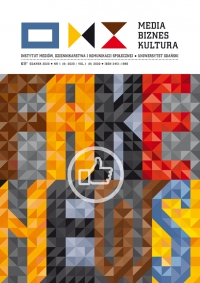The role of a social communication in gaining an acceptance for nuclear energy in France. The case of the Local Information Committees
Keywords:
social communication, energy projects, stakeholder involvement, risks perceptionAbstract
The adoption of the long strategy entitled the European Green Deal by the European Commission in December 2019 confirmed the consistency of the European Union (EU) in seeking to become a global leader in combating climate change, and thus the need to accelerate energy transformation in many EU countries. Countries whose accession to the EU took place after 2004 will have to face complex economic, legal, political and social challenges. Considering that the social and political conditions for changing energy culture include, among others, the processes of communication between authorities and society, it is important to recognise their significance in the process of creating and implementing socially “controversial” energy projects, such as the construction of nuclear power stations or wind farms. The aim of the article is to present the conditions of social communication in the field of methods and ways of social communication between the government, society, the investor and local authorities. Attention will be focused on Local Information Committees (CLIs) and their role in the French nuclear energy industry. The experience of France confirms that the process of gaining acceptance for socially “controversial” technologies is highly individualised, complex and multi-faceted.
Downloads
References
Monografie polskie
Bińczyk E., Epoka człowieka. Retoryka i marazm antropocenu, Wydawnictwo Naukowe PWN, Warszawa 2018.
Dobek-Ostrowska B., Podstawy komunikowania społecznego, Astrum, Wrocław 2007.
Łucki Z, Misiak W., Energetyka a społeczeństwo. Aspekty socjologiczne, Wydawnictwo Naukowe PWN, Warszawa 2010.
Mrozowska S., Polityka energetyczna Unii Europejskiej. Między strategią, lobbingiem a partycypacją, Wydawnictwo Libron, Kraków 2016.
Pietraś M., Międzynarodowy reżim zmian klimatu, Wydawnictwo Adam Marszałek, Toruń 2011.
Risk, media and stigma. Understanding public challenges to modern science and technology, red. J. Flynn, P. Slovic, H. Kunreuther, Earthscan, London 2001.
Stankiewicz P., Gra w atom. Społeczne zarządzanie technologią w rozwoju energetyki jądrowej, Wydawnictwo Naukowe Uniwersytetu im. Mikołaja Kopernika, Toruń 2017.
Monografie tłumaczone
Arnoldi J., Ryzyko, tłum. B. Reszuta, Wydawnictwo Sic!, Warszawa 2011.
Rozdziały z książek
Besta T., Czynniki psychologiczne związane z percepcją bezpieczeństwa technologii energetycznych: przegląd badań [w:] P. Kwiatkiewicz, R. Szczerbowski i in., Europejski wymiar bezpieczeństwa energetycznego a ochrona środowiska, Fundacja na Rzecz Czystej Energii, Poznań 2014.
Fischer F., Gottweis H., Introduction [w:] The argumentative turn revistited public policy as communicative practice, red. F. Fischer, H. Gottweis, Duke University Press Books, Durham–London 2012.
Mrozowska S., Problemy komunikowania i „włączania” społeczeństwa do projektów jądrowych w Unii Europejskiej [w:] Europejski wymiar bezpieczeństwa energetycznego a ochrona środowiska, red. P. Kwiatkiewicz, R. Szczerbowski i in., Fundacja na Rzecz Czystej Energii, Poznań 2014.
Slovic P., Finucane M., Peters E., MacGregor D.G., Risk as feeling: Some thoughts about affect, reason, risk and rationality [w:] The ethics of technological risk, red. L. Asveld, S. Roeser, Earthscan, London–Sterling 2009.
Wagner A., Medialny dyskurs jako przedmiot refleksji socjologicznej – kontekst teoretyczny i metodologiczny [w:] Widoczne i niewidoczne. Atom, łupki, wiatr w dyskursach medialnych wokół energetyki, red. A. Wagner, Wydawnictwo Uniwersytetu Jagiellońskiego,
Kraków 2016.
Wagner J.P., The Climate Change Policy of the European Union [in:] International politics of climate change, red. G. Fermann, Skandinavian University Press, Oslo 1997.
Artykuły z czasopism
Cotton M., Rattle I., Alstine J.V., Shal Gas Policy in the United Kingdom. An argumentative discource analysis, „Energy Policy” 2014, nr 73, s. 427–438.
Gadomska M., Potoczna percepcja i społeczna akceptacja skomplikowanych technologii. Przypadek syntezy termojądrowej, „Postępy Techniki Jądrowej” 2008, vol. 51, z. 1.
Kasperson R.E., Renn O., Slovic P., Brown H.S., Emel J., Goble R., Kasperson J.R.X., Ratick S., The social amplification of risks: A conceptual framework, „Risk Analysis” 1988, vol. 8, nr 2, s. 177–187.
Malischek R., Trüby J., The future of nuclear power in France: an analysis of the cost of phasing-out, „Energy” 2016, vol. 116, s. 908–921.
Poumadère M., Bertoldo R., Samadi J., Public perceptions and governance of controversial technologies to tackle climate change: Nuclear power, carbon capture and storage, wind, and geoengineering, „Wiley interdisciplinary reviews: Climate Change” 2011, nr 2(5),
s. 712–727.
Rosa E.A., Machlis G.E., Keating K.M., Energy and society, „Annual Review of Sociology” 1988, t. 10, s. 149–172.
Schneider S.H., Kellogg W.W., Ramanathan V., Carbon Dioxide and Climate, „Science” 1980, vol. 210, nr 4465, s. 6–7.
Turowski P., Ochrona klimatu czy gra interesów? Drugi pakiet klimatyczno-energetyczny Unii Europejskiej, „Bezpieczeństwo Narodowe” 2014, nr 3, s. 73–92.
Źródła internetowe
Denmark’s Energy and Climate Outlook. Baselino Scenario Projection Towards 2030 With Existing Measures (Frozen Policy), Danish Energy Agency, Copenhagen 2019, https://ens.dk/sites/ens.dk/files/Analyser/deco19.pdf.
Country Nuclear Power Profiles: France, IAEA 2019, https://cnpp.iaea.org/countryprofiles/France/France.htm.
Factors influencing the societal acceptance of new energy technologies: Meta-analysis of recent European projects, http://www.ecn.nl/docs/library/report/2007/e07058.pdf.
Fillon F., Bezpieczeństwo nuklearne, przemówienie premiera F. Fillona podczas wizyty w elektrowni jądrowej w Bugey, Saint-Vulbas, 29 sierpnia 2011 r., https://pl.ambafrance.org/Bezpieczenstwo-nuklearne,4709.
Gouvernement Rèpublique Française, Energy Transition, https://www.gouvernement.fr/en/energy-transition.
Komunikat Komisji do Parlamentu Europejskiego, Rady Europejskiej, Rady, Komitetu Ekonomiczno-Społecznego i Komitetu Regionów, Europejski Zielony Ład, Bruksela, 2019, COM (2019) 640 final.
Dokumenty i raporty
Europejski Zielony Ład, Komunikat Komisji do Parlamentu Europejskiego, Rady Europejskiej, Rady, Komitetu Ekonomiczno-Społecznego i Komitetu Regionów, Bruksela 2019, COM (2019) 640 final.
Pain M., Generalna Dyrekcja ds. Energii i Klimatu, 04.06.2013.
Society and Nuclear Energy. Case Histories of Practical Communication Experiences, Nuclear Energy Agency Organisation for Economic co-operation and Development, OECD 2005.
Stakeholder Involvement in Nuclear Issues. INSAG-20. The Report by the International Safety Group, International Atomic Energy Agency, Vienna 2006.
Inne
EDF, Terytorialny wymiar projektu Flamanville 3. Doświadczenia z wielkiej budowy, spotkanie robocze podczas wizyty studyjnej 29.09.2014 r. materiał w zbiorach własnych autora.

 Academic Scientific Journals
Academic Scientific Journals




